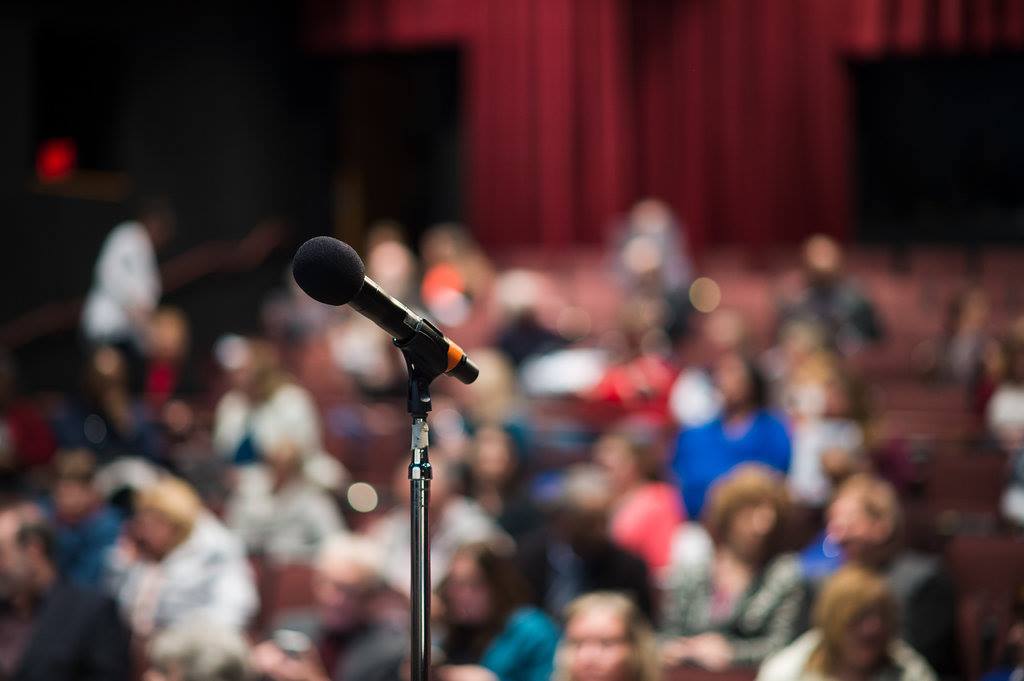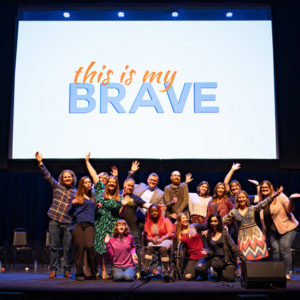This Is My Brave is proud to partner with Dr. Kristin Kosyluk, Ph.D., CRC, Assistant Professor of Mental Health Law & Policy at the University of South Florida and Director of the Stigma Action Research (STAR) Lab. The mission of the Stigma Action Research (STAR) Lab is to conduct community-engaged research in the area of stigma reduction, with a special emphasis on the stigma surrounding behavioral health conditions, which produces findings and identifies actions leading to real world impact.
Dr. Kosyluk is a Rehabilitation Counselor, Rehabilitation Counseling Educator and Researcher. She is currently an Assistant Professor of Rehabilitation Counseling at the University of South Florida in Tampa.
Anti-Stigma Evaluation Project: This is My Brave
This evaluation involves four separate research studies. The first two studies are complete and evaluated the impact of This Is My Brave programming on stigma among the audience members. The second two studies are currently in progress and aim to explore the impact of participation in This Is My Brave performances on the storytellers themselves.
Summary of TIMB Evaluation Projects:
1. A pre-post survey study provides pilot data on the efficacy of the This Is My Brave in reducing public stigma surrounding mental illness. (complete)
Click here to view a PowerPoint presentation highlighting the findings of the pre-post pilot study.
Click here to download a copy of the following manuscript reporting these findings in the article entitled Examining the Impact of This Is My Brave on Mental Illness Stigma and Willingness to Seek Help: A Pilot Study
Kosyluk, K.A., Marshall, J., Rivera Macias, D., Andrus, D.T., Guerra, D., Robinson, M., Ostos, A.P., & Chapman, S. (In Press). Examining the Impact of This Is My Brave on Mental Illness Stigma and Willingness to Seek Help: A Pilot Study. Community Mental Health Journal.
2. An RCT investigating the impact of This Is My Brave relative to a comparison anti-stigma condition and control condition and also examines possible mediators of This Is My Brave impact including character empathy, perceived similarity to characters, and character identification. This study was accepted for publication in the Community Mental Health Journal in May, 2020.
Click here to view the Abstract.
Kosyluk, K.A., Marshall, J., Conner, K., Macias, D., Macias, S., Wilks, B., Her, J. (2021). Challenging the Stigma of Mental Illness Through Creative Storytelling: A Randomized Controlled Trial of This Is My Brave. Community Mental Health Journal. 57. 10.1007/s10597-020-00625-4.
3. A quantitative study we are calling “Storyteller Study” evaluating the impact of participating in This Is My Brave performances on the performers with lived experience with mental illness. This study frames participation in This Is My Brave performances, publicly sharing one’s experience of mental illness, as having potential for reductions in self-stigma and increases in recovery, empowerment, and self-esteem. We hypothesize that participation in the This Is My Brave program by people with lived experience with mental illness will lead to (from pre-performance to post-performance):
- Greater perceived benefits of “coming out” with one’s story of mental illness.
- Decreased symptoms of depression and/or anxiety.
- Decreased shame and demoralization.
- Decreased implicit stigma of mental illness.
- Increased self-esteem.
- Decreased self-stigma (both implicit and explicit).
- Increased relationship closeness.
- Increased recovery.
- Increased empowerment.
- Increased self-determination.
4. A qualitative Storyteller Study exploring the impact of performing in a This Is My Brave show on performers’ lives and how performers made the decision to participate in the program.
5. The STAR Lab Director, Kristin Kosyluk, and STAR Lab Doctoral Students, Michelle Beekman, along with Jennifer Marshall (Co-Founder and former Executive Director of TIMB) and Dr. Kyaien Conner (Associate Professor of Mental Health Law & Policy at USF) were selected as a members of the 2019 Fall cohort of USF I-Corps Fellows. This was a rare honor and an exceptional opportunity, as the competition for the I-Corps program is rigorous, and USF is one of only a few designated I-Corps Sites around the country. The awarded proposal represented a partnership between Dr. Kosyluk, Dr. Kyaien Conner of USF’s Department of Mental Health Law & Policy, Ms. B. Michelle Beekman, and Ms. Jennifer Marshall, Co-Founder and former Executive Director of TIMB. The I-Corps program provided the team with a condensed, but intense, immersion in how to find the business behind their proposed idea (developing a product meant to harness the power of TIMB’s storytelling approach to stigma change to increase engagement with mental health care), with hands-on, real world experience.The team participated in a concentrated six session course (nicknamed “bootcamp”), from Monday, September 16, 2019 through November 4, 2019. The bootcamp was led by experts who will helped the team find and talk with future customers, create a business model canvas, and develop the proposed idea into a potentially viable commercial product or opportunity. To facilitate the team’s customer discovery process, they were awarded a $3,000 subgrant from NSF I-Corps Site grant (Kosyluk, PI). The team is currently pursuing external funding to test the effectiveness of their product.
6. A pre-post study of the impact of TIMB’s Facebook program, BraveTV, among college students is currently underway.
7. A pre-post study of the impact of viewing the TIMB mini-documentary on audience member stigma. You can find more info about the documentary here.
8. A qualitative project using Critical Discourse Analysis to examine the narratives of TIMB storytellers using the existing catalogue of TIMB videos to answer the following research question and sub-questions:
Main Research Question: How do power structures influence the experience of mental illness or substance use disorders for TIMB performers
Sub Questions:
- How do TIMB performers define recovery?
- How do TIMB performers communicate about illness? Wellness?
- What stalls recovery among TIMB performers?
- What are the stigma experiences relayed in TIMB performances?
- How is stigma talked about in TIMB performances?
- How is treatment talked about in TIMB performances?
- What are the barriers to treatment communicated in TIMB performances?
- What are the facilitators to treatment communicated in TIMB performances?
The qualitative project involves a partnership with doctoral students, Breanne Casper and Heather Henderson (USF’s Anthropology Department).
9. This Is My Brave: Stories from The Black Community
Drs. Kyaien Conner and Dr. Kristin Kosyluk were awarded funding by the Office of the Provost and USF Research & Innovation through the Rapid Response Research Grant program titled “Understanding and Addressing Blackness and Anti-Black Racism.”
The Impact of a Culturally Meaningful Storytelling Intervention on Stigma and Attitudes About Mental Health Treatment
PIs: Kyaien Conner and Kristin Kosyluk, College of Behavioral and Community Sciences
Community Partners: This is My Brave (TIMB), WE-CARE and the Central Florida Behavioral Health Network
Despite research that suggests Black Americans are 20 percent more likely to experience mental illness, only one in three seek treatment. The project proposes to deliver and evaluate a special series titled “This is My Brave (TIMB): Stories from the Black Community”. This virtual two-part series highlights the voices of Black Americans living with mental illness and/or addiction who bravely share their experiences with illness and treatment as well as messages of hope and recovery, with the goal of reducing stigma and encouraging critical conversations about Black mental health.
A link to the article for purchase is available here.
Click here to read more about this special series.
Click here to read the press release.

